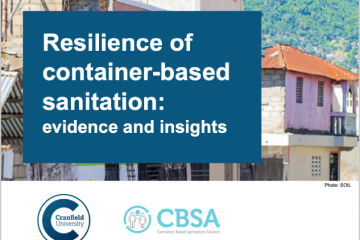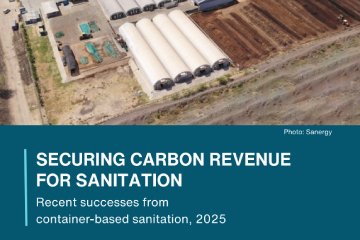Pathways to a healthy net-zero future by The Lancet Pathfinder Commission identifies container-based sanitation (CBS) as a key solution for delivering climate action with health co-benefits.
Sanitation, climate and health – an under-researched area for action
The Lancet Pathfinder Commission was established to collate and assess then evidence on the near-term health effects of GHG mitigation. The 2023 report includes an umbrella review of relevant systematic reviews as well as evaluated case studies on implementation. It recognises that sanitation is a critical area for climate action, but found no studies examining the potential for mitigation savings and health benefits from actions in waste and sanitation and concluded that the development and laboratory testing of suitable sanitation technologies, and their evaluation for GHG and health benefits at scale in field trial settings, is under-researched.
The sanitation, climate and health nexus
The review points to evidence of the health benefits that safely managed sanitation can bring, including for reductions in reported diarrhoea, which was estimated to account for approximately 9% of all deaths among children under age five worldwide in 2021. It also highlight the concerns that have been raised about the potential GHG emissions arising from standard pit latrines, which use anaerobic decomposition and release methane, a major source of global heating, and may comprise 7% of emissions in India.
The promise of container-based sanitation
The paper discusses a number of solutions including increasing coverage of sewers, systems that use aerobic digestions and CBS. CBS systems represents a transformative approach in this sector because, unlike traditional pit latrines, which rely on anaerobic decomposition and can lead to significant methane emissions, CBS reduces emissions through the quick removal and treatment of waste. This is done through the collection of human waste in sealed containers, which are then transported to facilities for safe processing and disposal.
Cost and scalability
The Pathfinder Commission’s report also says that CBS can be costly to scale up and requires road access. However, there is growing evidence that the cost of CBS is comparable to other similar sanitation options as well as having lower capital needs. To reach the low-income and hard to reach areas that CBS is well suited to serve will likely require public subsidy, but so other forms of safe and inclusive sanitation benefit from these as well. Moreover, while there is a need for roads in some parts of the service chain, many operators use had carts and other small vehicle that can navigate informal areas before transferring to larger trucks.
CBS: crucial to supporting health and the transition to a net-zero future
The Lancet’s emphasis on container-based sanitation highlights its dual role in mitigating climate change and enhancing public health. As nations strive to meet the goals of the Paris Climate Agreement, CBS represents a tangible and impactful solution. By reducing methane emissions and improving sanitation, it not only addresses immediate health concerns but also contributes to long-term sustainability. Pathways to a healthy net-zero future is yet another report reinforcing CBS as crucial for achieving a just and equitable transition to a net-zero future, where health and climate benefits go hand in hand.


